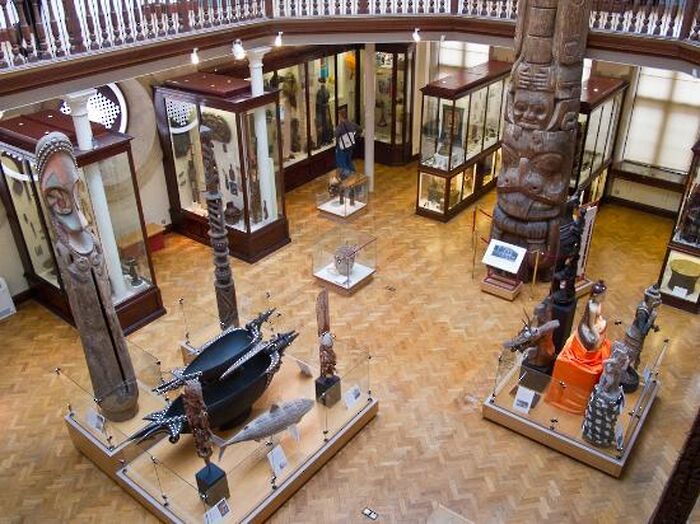Jesus College to return Benin Bronze Okukor to Nigeria
The Okukor, which was taken from Benin in 1897, has been in storage since the Jesus College Student Union (JCSU) passed a motion in favour of its repatriation in early 2016

Jesus College have formally agreed that the Okukor, one of the Benin Bronzes, should be returned to Nigeria. This decision, announced today, comes following recommendations from the College’s Legacy of Slavery Working Party (LSWP).
The Benin Bronze Okukor, which was taken from Benin in 1897, has been in storage since the Jesus College Student Union (JCSU) passed a motion in favour of its repatriation in early 2016. It has long been the subject of calls for repatriation, from activists in Cambridge and international organisations alike.
In a statement on their website, Jesus College confirmed: “Over the last three years, we have been in discussion with a member of the Benin Dialogue Group and that has led us to conclude that this royal ancestral heirloom belongs with the current Oba at the Court of Benin”.
The Oba of Benin is the traditional ruler and custodian of the culture of the Edo people, and head of the historic Eweka dynasty of the Benin Empire, a West African empire centred on Benin City, which is located in present-day Nigeria.
The College has not yet confirmed exactly when, or how, the Okukor will be returned to Nigeria.
Jesus’ LSWP began its work in May, seeking to examine, among other issues, the “provenance” of the Benin Bronze Okukor and “the legal and moral status of its ownership”.
The Okukor was among the thousands of 'Benin Bronzes' looted during the destruction of Benin City in 1897. These artefacts were stolen and auctioned off by the British under the pretext of covering the cost of an exhibition to avenge the deaths of nine officers killed during a trade dispute between the Benin Monarch – Oba Ovonramwen – and Britain.
In a brutal imperial raid, British field commanders were instructed to burn down the kingdom's towns, and the Oba was deposed. The British forces massacred local people.
The Okufor was bequeathed to Jesus College in 1905 by Captain George William Neville, a former British Army Officer and father of a Jesus College student, where it has resided ever since. It was previously displayed in the College’s dining hall prior to its removal, three years ago, following widespread student protest.
“There is no doubt that the statue was looted directly from the Court of Benin as part of the punitive expedition of 1897 and given to the College in 1905 by the father of a Jesus College student,” said Jesus College’s official statement.
After its removal from display in 2016, the College promised to work alongside museum authorities “to discuss and determine the best future for the Okukor, including the question of repatriation”.
Announced today, the return of the Benin Bronze Okukor by Jesus College will come more than 80 years after the Court of Benin first called for the repatriation of its looted artwork.
Following the LSWP’s recommendations, the College have also pledged to “acknowledge and contextualise” the role of Tobias Rustat, one of Jesus’ largest early benefactors, who gained much of his wealth through investment in the slave trade.
The Rustat Conferences, based at Jesus College, are named after him.
Rustat gained great personal wealth through investing in a range of transatlantic trading companies, including the Royal African Company which, according to historian William Pettigrew, “shipped more enslaved African women, men and children to the Americas than any other single institution during the entire period of the transatlantic slave trade.” Reflecting on Rustat’s involvement, Jesus College said that “investors were fully aware of its activities and intended to profit from this exploitation.”
Speaking of the LSWP’s work and conclusions, Master of Jesus College, Sonita Alleyne said: “These decisions have not been taken to erase history. We are an honest community, and after thorough investigation into the provenance of the Benin Bronze and Rustat’s investment in the slave trade, our job is to seek the best way forward.”
Earlier this term, Alleyne had said in an interview with Varsity that the College’s possession of the stolen artefact was “very much in my in-tray, after two weeks of being here”.
 Comment / Cambridge students are too opinionated 21 April 2025
Comment / Cambridge students are too opinionated 21 April 2025 News / Candidates clash over Chancellorship25 April 2025
News / Candidates clash over Chancellorship25 April 2025 News / Cambridge professor paid over $1 million for FBI intel since 199125 April 2025
News / Cambridge professor paid over $1 million for FBI intel since 199125 April 2025 News / Zero students expelled for sexual misconduct in 2024 25 April 2025
News / Zero students expelled for sexual misconduct in 2024 25 April 2025 Comment / Does the AI revolution render coursework obsolete?23 April 2025
Comment / Does the AI revolution render coursework obsolete?23 April 2025







